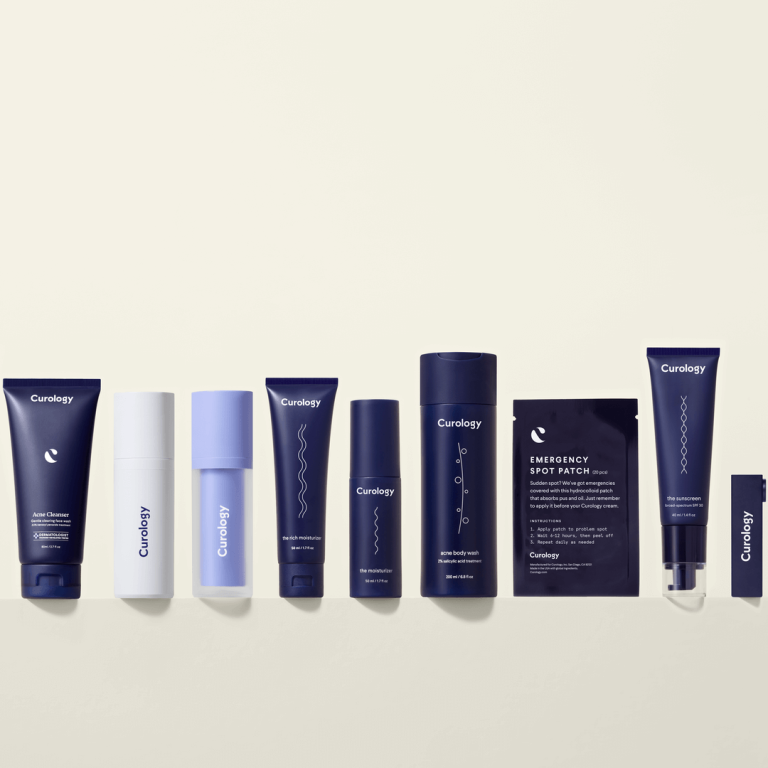How it works:
Share your skin goals and snap selfies
Your dermatology provider prescribes your formula
Apply nightly for happy, healthy skin
How it works:
How it works:
Share your skin goals and snap selfies
Your dermatology provider prescribes your formula
Apply nightly for happy, healthy skin
How it works:
Retinol’s potential side effects: Experts weigh in
Red, dry, and flaky skin are typically temporary side effects of this anti-aging powerhouse.



When it comes to skincare, retinol is often touted as a miracle ingredient. It stimulates the natural skin cell cycle, sloughing dead skin cells and boosting collagen production. However, if you use too much too fast, your skin might not be happy.
Retinol’s side effects—which are, thankfully, usually temporary—typically occur when you’re just starting out, as your skin adjusts. Here we’ll explain the common side effects of retinol and help you determine if this potent ingredient is right for you. We’ll also give you some guidelines on the appropriate age to start retinol and what long-term side effects may occur.
Know your skin type and condition before using retinol
Retinol is a type of retinoid—a group of vitamin A derivatives. The term “retinoid” has come to include the many vitamin A-based skincare products, including the stronger prescription-strength tretinoin.¹
Retinol cream and retinol serum are available over the counter and are FDA-approved to treat signs of aging. They’re safe for most skin types but can adversely affect skin conditions such as eczema or rosacea. Some people with eczema find they can tolerate retinol as long as they avoid applying it to dry patches. Retinol also shouldn’t be used while pregnant, breastfeeding, or trying to conceive.
Although retinol may be used for all skin types, there may be better choices for dry or sensitive skin. Some people with these skin types might be able to tolerate it but would need to begin with a low concentration and ease of use.
Retinol increases the turnover of surface skin cells. When you first start using it, dead skin cells slough off faster than they are regenerated. Thus, retinol products may increase skin sensitivity.
Potential retinol side effects on the skin
Retinol promotes skin cell turnover by increasing the skin cell renewal rate. The benefit is increased collagen production, resulting in younger-looking skin with reduced fine lines and wrinkles.²
Even though retinol has many benefits, there are also side effects associated with its use. Typically, these are temporary and resolve once the skin adjusts. Most often, retinol side effects result from using higher concentrations more frequently, which is why you should “start low and go slow.”
Here are some potential side effects of topical retinol:
Sun sensitivity. Retinol can leave skin more vulnerable to UV rays.³ Retinol should be used as part of a nighttime skincare routine, and sunscreen with SPF 30 or higher should be used during the day (and that holds true even if you’re not using retinol).
Flaking and peeling. During the adjustment period, dead skin cells shed more quickly, leading to dry, peeling, or flaking skin. This potential side effect is only temporary and usually resolves once the skin acclimates.
Irritation and redness. The benefits of this product have a lag time before appearing. In the beginning of retinol use, skin cells shed faster than they replenish, which may cause the skin to become red and irritated.
Dry skin and itchiness. The same properties that cause flaky, irritated skin may also cause dry, itchy skin. Retinol promotes skin cell turnover, which is excellent for combating premature aging and photoaged skin, but it takes some getting used to.
To prevent dry, irritated, and flaky skin, use a rich moisturizer morning and night. You may want to apply moisturizer before applying retinol. Apply retinol to a dry face to prevent it from absorbing too quickly into the skin.
Retinol's side effects on the eyes aren’t common, but side effects have been shown with oral retinoid prescriptions like isotretinoin (aka Accutane), which is used to treat severe acne. Symptoms include dry eye, night and color vision disturbances, and eyelid inflammation. Studies suggest that dry eye symptoms are dose-dependent.⁴
Even though isotretinoin and retinol are different, care should be taken when using retinol around the eyes.
What about long-term retinol use?
It’s unlikely you’ll experience retinol side effects long-term. However, retinol can leave your skin more vulnerable to sun damage, so it’s important to apply sunscreen daily. The American Academy of Dermatology (AAD) recommends a water-resistant, broad-spectrum sunscreen with SPF 30 or higher.⁵
Most common side effects are temporary and subside once the skin adjusts. Several studies were conducted over one to four years evaluating different strengths of retinoids and showed retinoids were well tolerated with no adverse side effects.⁶ The benefits of tretinoin are typically seen gradually over a long period of time.
At what age should you start using retinol?

Remember, everyone’s skin is different, so there’s no hard-fast rule about when to start using retinol or any skincare product. The age you begin using retinol is a personal decision—something to discuss with your licensed dermatologist or dermatology provider.
Retinol boosts collagen production, which begins to break down in a person’s 20s and continues throughout their lifetime. Collagen breakdown is accelerated in photodamaged skin (so always wear sunscreen!) and may reduce by as much as 75% by age 80.⁷
That said, retinol isn’t necessarily a “forever” product. Deciding when to stop using retinol is also a personal decision. Other ingredients, such as ceramides, hyaluronic acid, vitamin C, and vitamin E may be another option as your skin matures. That’s why we support building a relationship with your dermatology provider so you have someone in your corner as your skin goals naturally change.
Let Curology be your guide
Retinol has its perks, but it isn’t the only option for anti-aging. If you want to use a more powerful retinoid, such as tretinoin, you’ll need to see a medical provider for a prescription. That’s where we come in.
Curology is here to take the guesswork out of your skincare routine. Our licensed dermatology providers work with you to examine your skin, assess your skincare goals, and provide custom treatment options.*

Getting started is easy. Simply answer a few questions and snap a few selfies to help us get to know your skin. If Curology is right for you, we’ll pair you with one of our in-house licensed dermatology providers who will prescribe a personalized formula based on your skin goals. They’ll also be there to answer any skin-related questions you may have and tweak your skincare routine as needed.
FAQs
It’s unlikely you’ll experience retinol side effects long-term. However, retinol can leave your skin more vulnerable to sun damage, so it’s important to apply sunscreen daily. The American Academy of Dermatology (AAD) recommends a water-resistant, broad-spectrum sunscreen with SPF 30 or higher.
Retinol boosts collagen production, which begins to break down in a person’s 20s and continues throughout their lifetime. Collagen breakdown is accelerated in photodamaged skin (so always wear sunscreen!) and may reduce by as much as 75% by age 80.
P.S. We did the homework so you don’t have to:
American Academy of Dermatology. Retinoid or retinol? (n.d.).
Kong, R., et al. A comparative study of the effects of retinol and retinoic acid on histological, molecular, and clinical properties of human skin. Journal of Cosmetic Dermatology. (March 2016).
Mukherjee, S., et al. Retinoids in the treatment of skin aging: An overview of clinical efficacy and safety. Clinical Interventions in Aging. Ibid.
Bergler-Czop, B., et al. Side effects of retinoid therapy on the quality of vision. ACTA Pharmaceutica. (2016 October 14).
American Academy of Dermatology. Sunscreen FAQs. (n.d.).
Mukherjee, S., et al. Retinoids in the treatment of skin aging: an overview of clinical efficacy and safety. Clinical Interventions in Aging. Ibid.
Varani, J., et al. Decreased collagen production in chronologically aged skin. American Journal of Pathology. (June 2006).
Erin Pate is a board-certified Family Nurse Practitioner at Curology. She earned her Masters of Science in Nursing at Florida Atlantic University in Boca Raton, FL.
* Subject to consultation. Subscription is required. Results may vary.

Curology Team

Erin Pate, NP-C